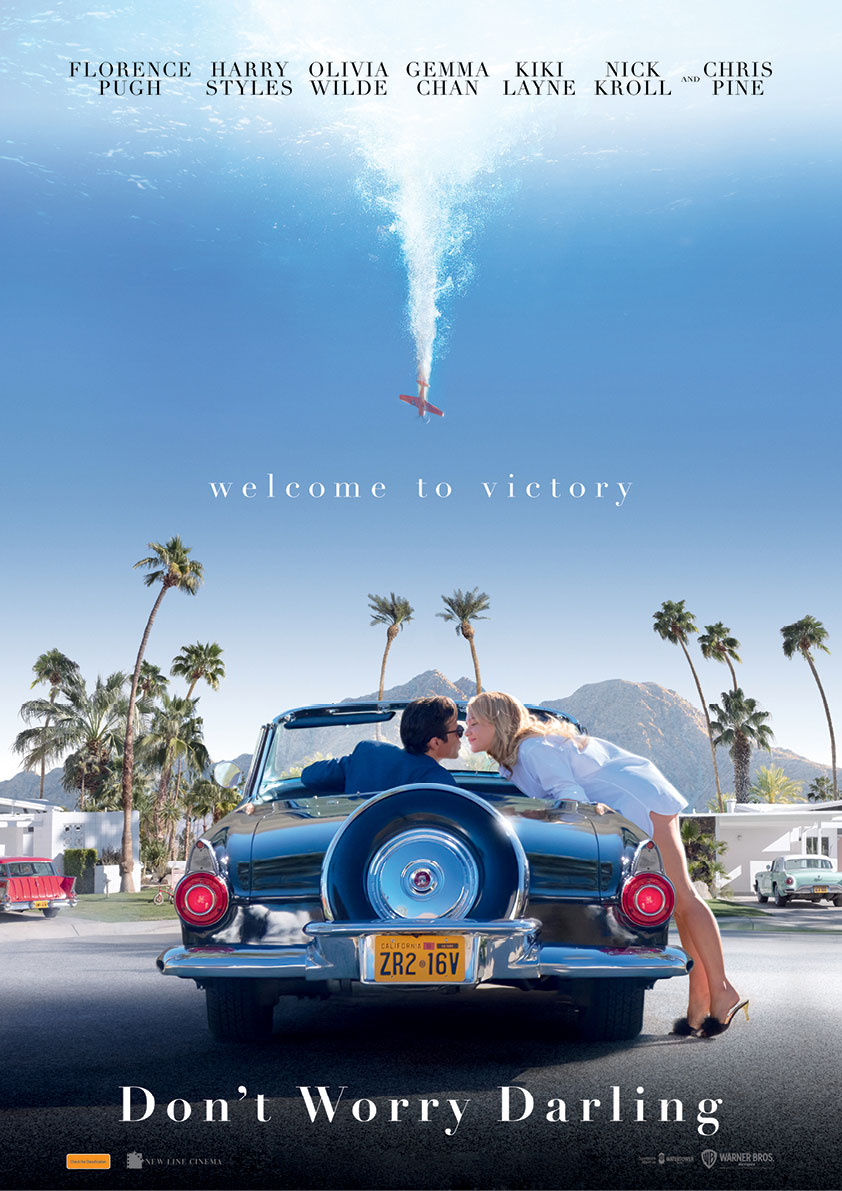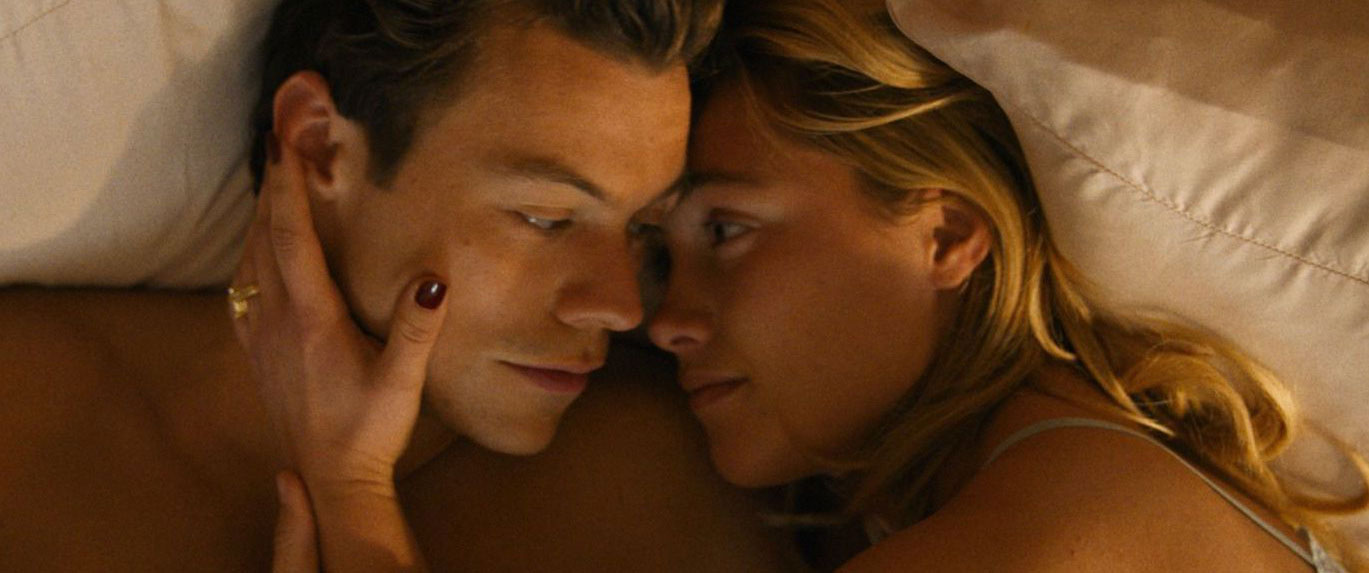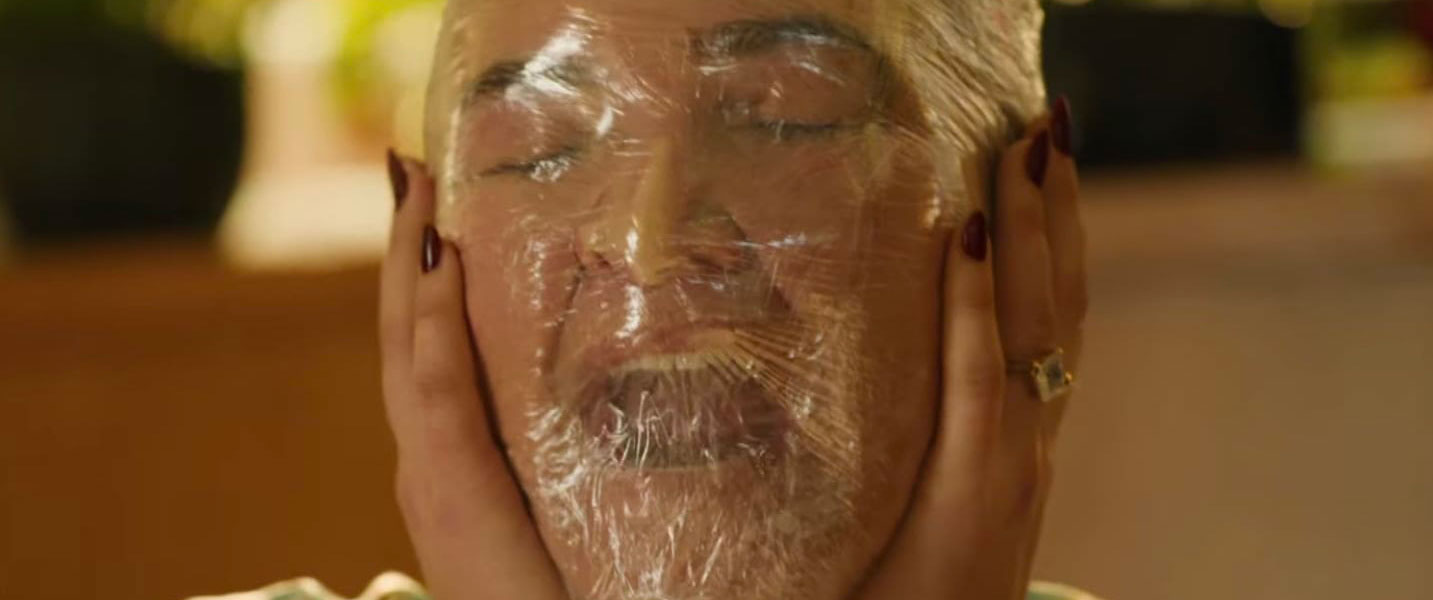
Director: Olivia Wilde
Writers: Katie Silberman (screenplay), Carey Van Dyke, Shane Van Dyke (story)
Cast: Florence Pugh, Harry Styles, Chris Pine, Olivia Wilde, Kiki Layne
Producers: Roy Lee, Katie Silberman, Olivia Wilde, Miri Yoon
Music: John Powell
Cinematographer: Matthew Libatique
Editor: Affonso Gonçalves
Cert: 15
Running time: 122mins
Year: 2022

What’s the story: Alice Chambers (Pugh) lives with her husband Jack (Styles) in the idyllic 1950s desert town of Victory. But, a series of strange occurrences leads Alice to suspect sinister goings-on in this apparent Eden.

What’s the verdict: Don’t Worry Darling arrived at the Venice Film Festival on a wave of anticipation. The trailer was intriguing. Florence Pugh has not put a foot wrong yet. Olivia Wilde’s directorial debut Booksmart was one of 2019’s best movies.
But, post-premiere that wave of anticipation turned into a tsunami of toxic gossip. Wilde and Pugh reportedly had feuded on set. Wilde and original leading man Shia LaBeouf’s accounts of why he exited the film turned into a public “he said, she said.” LaBeouf’s replacement, Wilde’s real-life partner Harry Styles, was kicked in the thespians when an out of context clip from the film hit social media. Styles’ insipid interview comments about the film had Chris Pine astral projecting to another plain of being. Then the world became obsessed with whether Styles spit on Pine at the festival.
After all this, the inevitable capper was that the reviews were middling to sub-equatorial. Oh, Don’t Worry Darling has problems. Chiefly centred around a climactic revelation that arrives too late in the day and retroactively peppers the film with logic holes. Better may have been the film showing its hand midway through, and characters then dealing with the fallout (it’s not a spoiler to say the town is not all it seems). But there is plenty to enjoy here.
The plot is the stuff of female paranoia movies from Gaslight to Rosemary’s Baby to The Stepford Wives and beyond. Alice lives in a spacious, gorgeous house in Victory. She is happily married to boyish husband Jack. Victory is out in an unnamed part of the desert, and founded by Chris Pine’s Frank. Frank is an entrepreneur genius and possibly some kind of self-help guru. He also owns the Victory corporation where all the men work, while their wives tend to the home and have dinner on the table and a drink ready in the evening.
Alice begins to suspect something rotten dwells within Victory when her friend Margaret (Layne) is politely ignored while having a nervous breakdown, after venturing out into a restricted zone in the desert. Not even Bunny (Wilde), Alice’s bestie, offers any support. Soon, Alice is finding her own grasp on reality weakening, with the world turning against her. Particularly that immaculate home.

To dismiss Don’t Worry Darling for a fumbled final reveal is to ignore its many delights. Praising the visuals may seem like a back-handed compliment. But with this seemingly tranquil 1950s suburb, Wilde, cinematographer Matthew Libatique, Production Designer Katie Bryon, and Supervising Art Director Erika Toth have created a queasily perfect suburban utopia, as unnerving as it is beguiling. Their jumping off point is the Mid-Century Modern, that clean-lined, pastel aesthetic that influences all depictions of 1950s, or 1950s inflected, suburbia. Which places Wilde’s film in the same neighbourhood as Edward Scissorhands, The Truman Show, various iterations of The Stepford Wives, the underseen Vivarium, and, erm, WandaVision.
Katie Silberman’s screenplay does not score huge originality points in its dissection of sex, class, and racial divides of 1950s America. Although Victory, the town, the company, and the “V” logo, nicely shifts and slips its meaning when Alice discovers what is actually going on at Victory, Inc. Silberman and Wilde also score in the depiction of the corrosive effects the apparently perfect lifestyle has on the female characters. Pine, whose Frank is part Scientology founder L. Ron Hubbard if played by Tom Cruise, embodies that 1950s obsession with individualism and the misogyny underpinning classic psychoanalysis.
At the film’s centre is Pugh, as good here as in Midsommar. If she and Wilde were feuding on set, it is not apparent in their scenes together. Her Alice navigates the film’s not-so-wonderland via a convincing blend of unease, panic, and resilience. The use of mirrors to reflect her fracturing psyche seems to quote the classic anime Perfect Blue, plus Black Swan and the 2018 Suspiria. All this emerges as more than mere cinematic pilfering however, due to Pugh’s excellent performance, and Wilde’s gift for conjuring atmospheres of dread and uncanny. For the record, Styles is better than those reviews would have you believe.
Don’t Worry Darling is likely to split opinion, and that final reveal does unbalance the movie. But, Wilde’s sophomore directorial outing is a fine example of how a film’s glittering parts can be enough to compensate for the uneven whole.
Rob Daniel
Twitter: rob_a_Daniel
Podcast: The Movie Robcast
